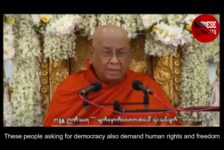10 December 2023 marks the 75th anniversary of one of the world’s most groundbreaking global pledges: the Universal Declaration of Human Rights (UDHR). This landmark document enshrines the inalienable rights that everyone is entitled to as a human being – regardless of race, colour, religion, sex, language, political or other opinion, national or social origin, property, birth or other status.
The Declaration was proclaimed by the United Nations General Assembly in Paris on 10 December 1948 and sets out, for the first time, fundamental human rights to be universally protected.
Among its crucial articles are Articles 18 and 19, which address the principles of freedom of thought, conscience, belief or religion, and expression. These articles are cornerstones in the edifice of human rights, emphasizing the importance of individual liberties in fostering a just and equitable society.
Article 18: Freedom of Thought, Conscience, and Religion:
Article 18 of the UDHR asserts the right to freedom of thought, conscience, and religion. It recognizes the inherent dignity and autonomy of every individual to hold and practice their beliefs without fear of coercion or discrimination. This encompasses the freedom to choose, change, or abandon one’s religion or belief, as well as the right to manifest these beliefs in worship, observance, practice, and teaching.
The significance of Article 18 lies in its commitment to fostering a diverse and pluralistic society that respects the individual’s right to embrace their own spiritual or philosophical path. By safeguarding the freedom of thought and religion, Article 18 contributes to the creation of an environment where people can coexist harmoniously despite their differences, fostering a culture of tolerance and understanding.
Article 19: Freedom of Expression:
Article 19 of the UDHR protects the right to freedom of opinion and expression. It emphasizes the right to seek, receive, and impart information and ideas through any media and regardless of frontiers. This article acknowledges the role of free expression as a cornerstone of democracy, enabling individuals to participate in the political, social, and cultural life of their society.
The importance of Article 19 becomes evident in its role as a catalyst for progress and social change. Freedom of expression allows for the exchange of diverse perspectives, the questioning of established norms, and the dissemination of information critical to an informed citizenry. It empowers individuals to hold those in power accountable, contributing to the checks and balances necessary for the protection of human rights and the advancement of society.
Interconnected Rights:
Articles 18 and 19 are interconnected, forming a symbiotic relationship that reinforces the principles of a free and just society. The ability to freely express one’s thoughts and beliefs is intricately linked to the freedom to hold and practice those beliefs without fear of persecution. Together, these articles create a framework that nurtures a society where individuals can live authentically, express themselves openly, and engage in constructive dialogue with others.
About AAI
Atheist Alliance International has special consultative status with the Economic and Social Council of the UN since 2013. It is committed to educating its members and the general public about atheism and related issues through its publications, advocacy, and community-building activities.
Atheist Alliance International stands for human rights focusing on the Rights to Freedom of Thought and Freedom of Expression outlined above. If you would like to support us there are 5 great reasons to join us.









